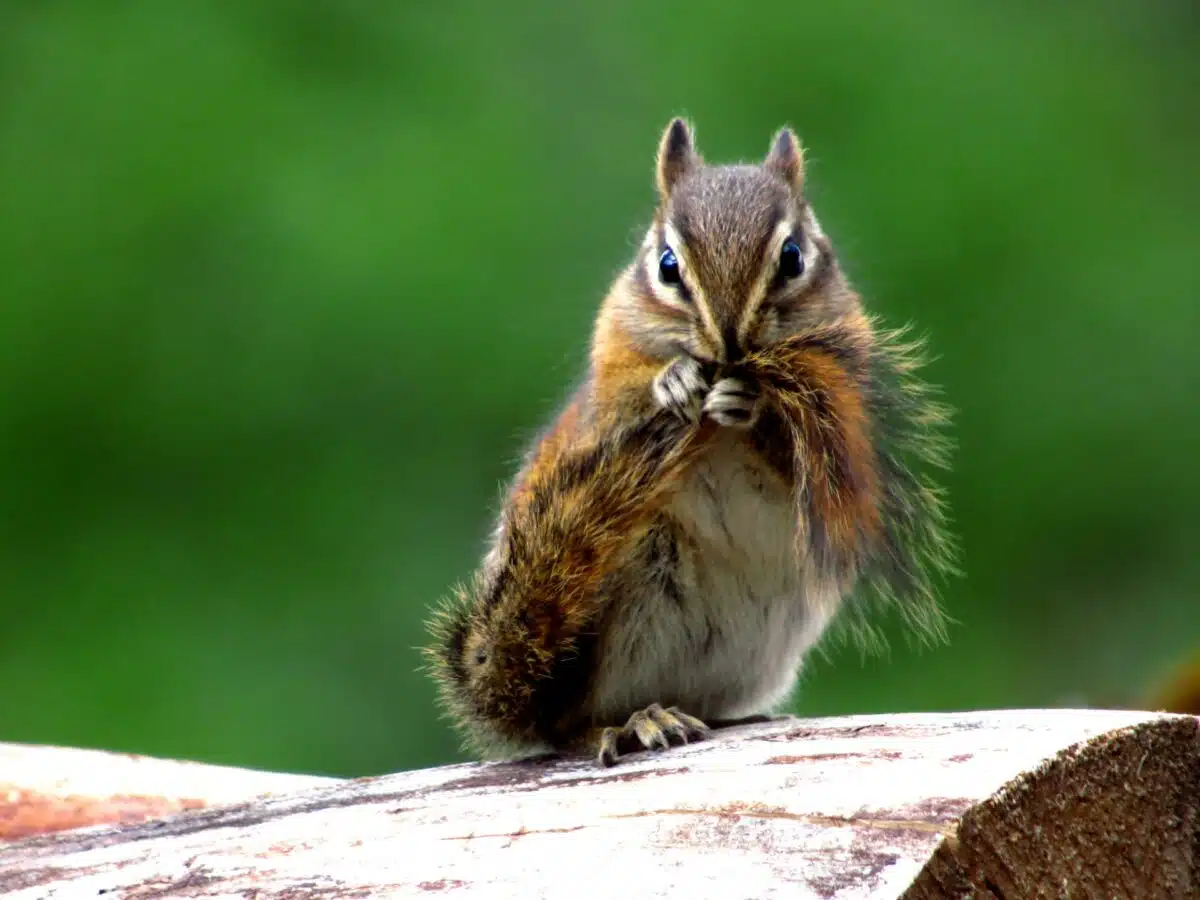We’re sure you’re familiar with chipmunks, but how familiar are you with chipmunk poop? Let’s investigate!
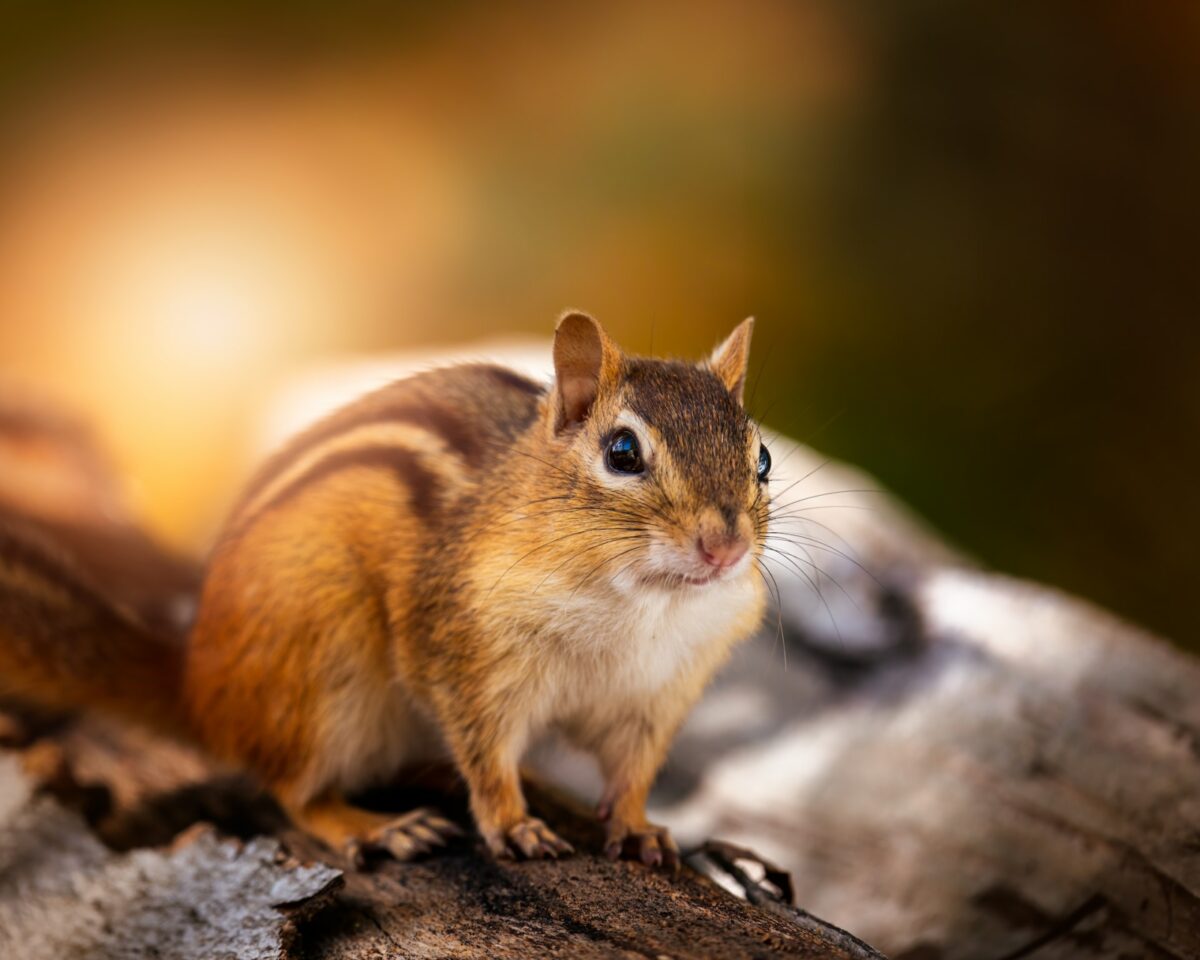
Chipmunks are lovable petite creatures that are frequently spotted in spaces around human residences. People view chipmunks as something not further than tiny fuzzy forest critters. They are normally seen scurrying in the backyards searching for nuts or fruits, and after doing their search, they might also end up looking in the dustbins.
Not all chipmunks are bothersome, but it doesn’t them long for them to become pests. Regardless of their being very cute, they are known to cause serious destruction to the garden by pulling up small plants with their roots out. There have been reports of flooding in basements and damages causing the walls and fences to collapse as a consequence of chipmunks digging deep networks of burrows.
Apart from these major disasters, they are usually found garden furniture, chewing wires, or objects in the basement. This allows them to perfectly sharpen their teeth, also known as incisors. Accordingly, it is essential to keep an eye on the chipmunk population before they become worrying. The evidence of their poop can confirm their presence and manifestation.
In this post, we will cover all you need to know about chipmunk poop. For a quick overview of the chipmunk lifestyle, check out this article.
What Does a Chipmunk Poop Look like?
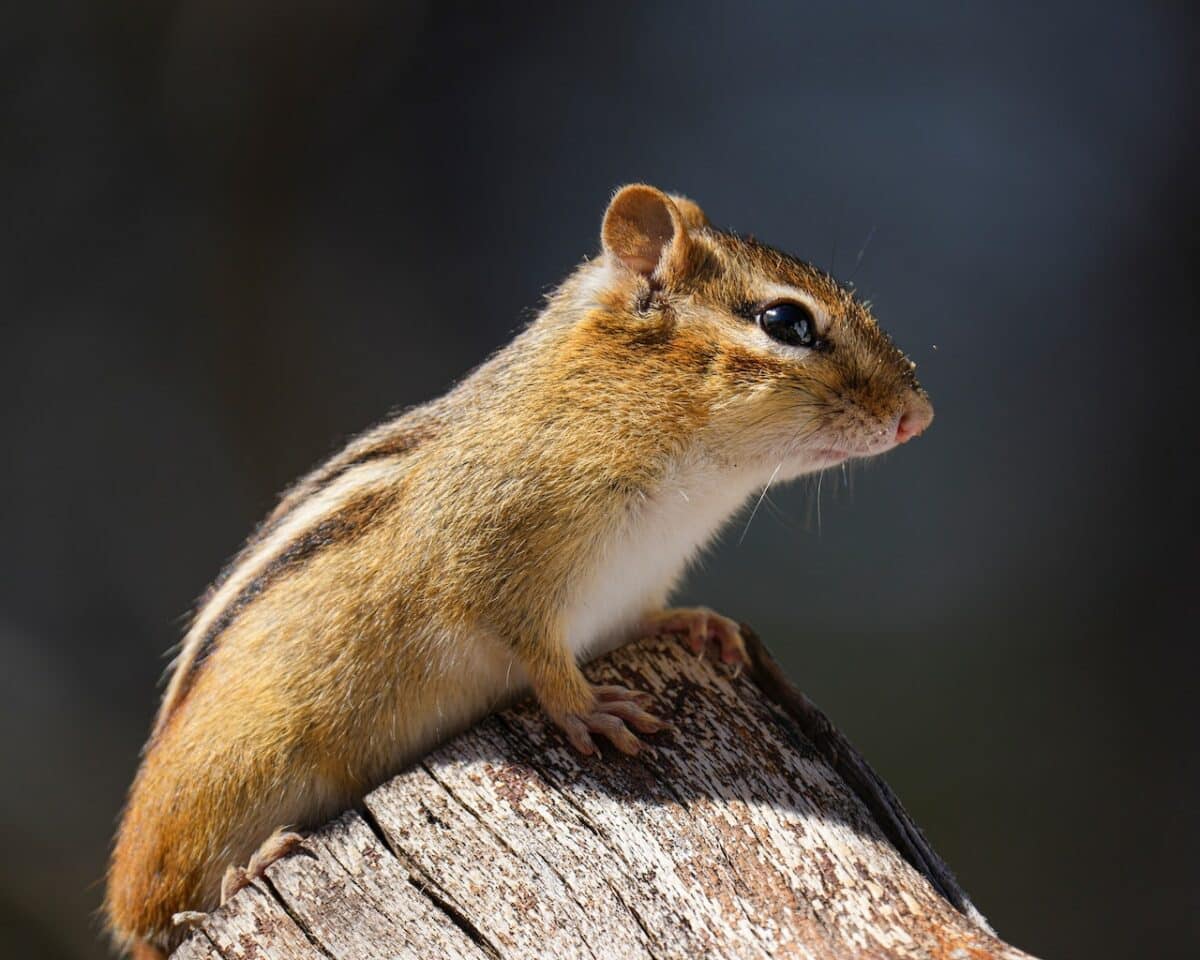
The chipmunk poop or droppings are pellet-shaped with elongated and pointed ends. Each piece can measure less than 0,4 inches (one centimeter.) On first look, it is very common to confuse them with a rat’s dropping as they are very similar looking. But a closer look shows that chipmunk poop is smaller in size when compared to a rat’s poop.
The Biggest Myth Concerning Chipmunk Poop
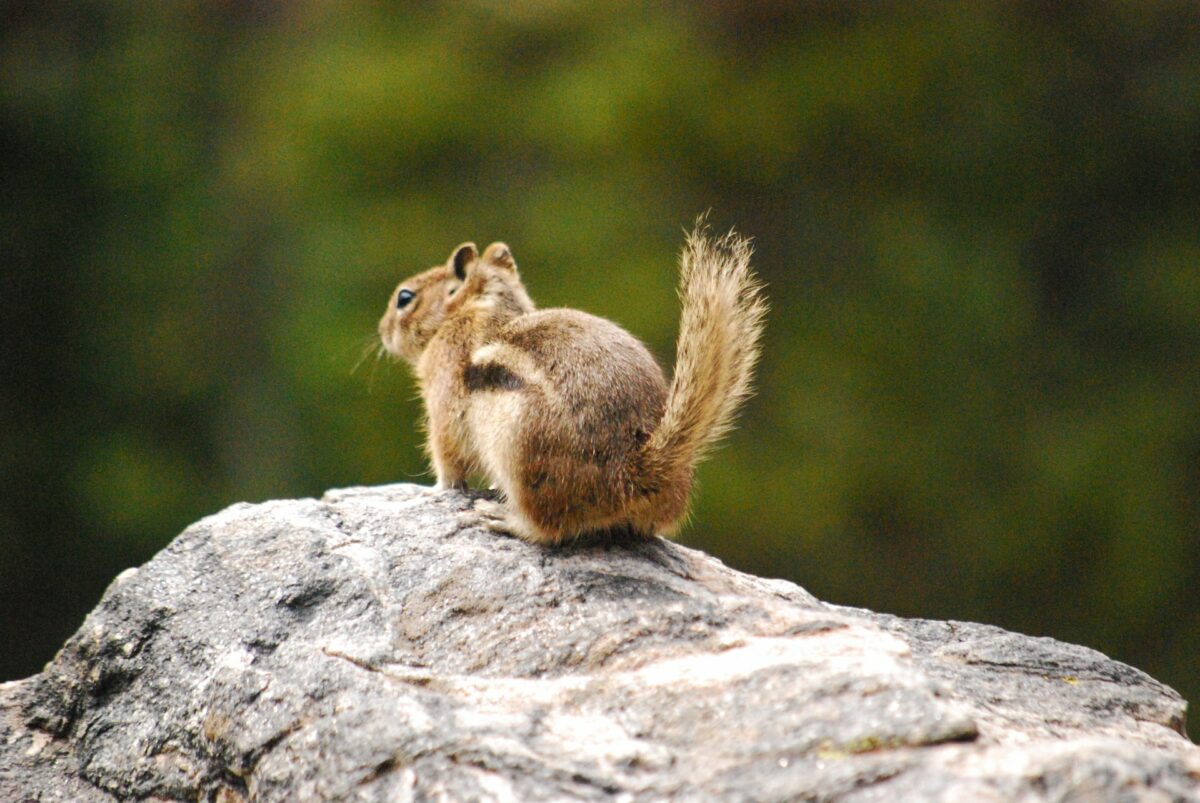
The most common myth regarding chipmunks is that they never poop. People began believing this because they don’t often see the chipmunks pooping or even can’t see their feces lying in their yards. Of course, this is only a myth, and it is an established fact that chipmunks do actually poop.
Chipmunks are extremely vulnerable to predator attacks. These tiny critters are practically helpless against bigger predators, and their best defence is to stay hidden.
For that reason, chipmunks have particular compartments inside their tunnels to poop. They won’t typically poop elsewhere apart from their dedicated toilet site. In the same way, chipmunks that live in nests rather than burrows typically choose a specific location for pooping, making sure that it is away from where they live. They do this to ensure that predators do not sense the chipmunk’s presence from the odor of their poop. Chipmunks fear being traced by the odor of their poop, leading the predators to their burrows.
How to Identify Chipmunk Droppings?
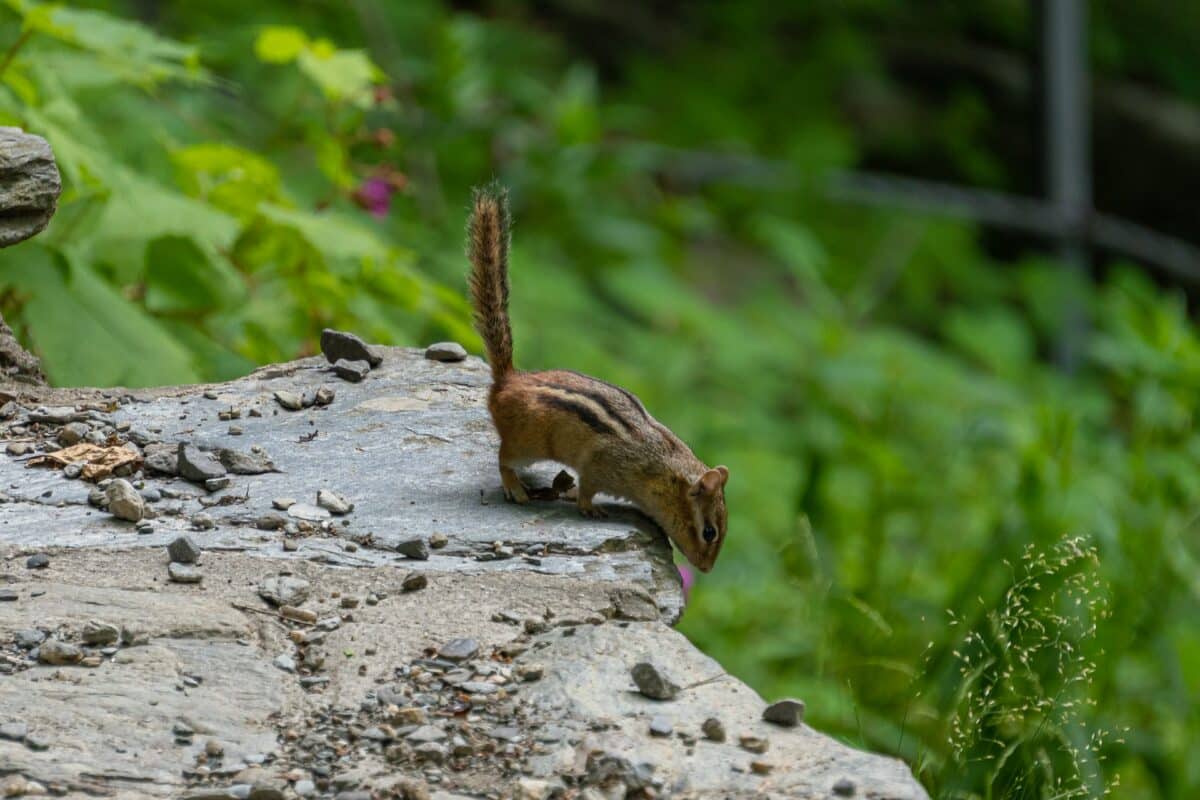
Chipmunk droppings are very similar looking to a rat’s poop. They can be so small that they resemble grains of rice. Rat’s poop measures 3/4th of an inch, whereas a chipmunk’s poop measures only 3/8th of an inch.
One would have to look closer to recognize and differentiate between the droppings of these two creatures. An expert can tell that a chipmunk’s poop is smaller and leaner in size than a rat’s poop. Chipmunk poop does not have a separate smell, so you may not differentiate droppings by smell alone.
Color Is a Key Identifier
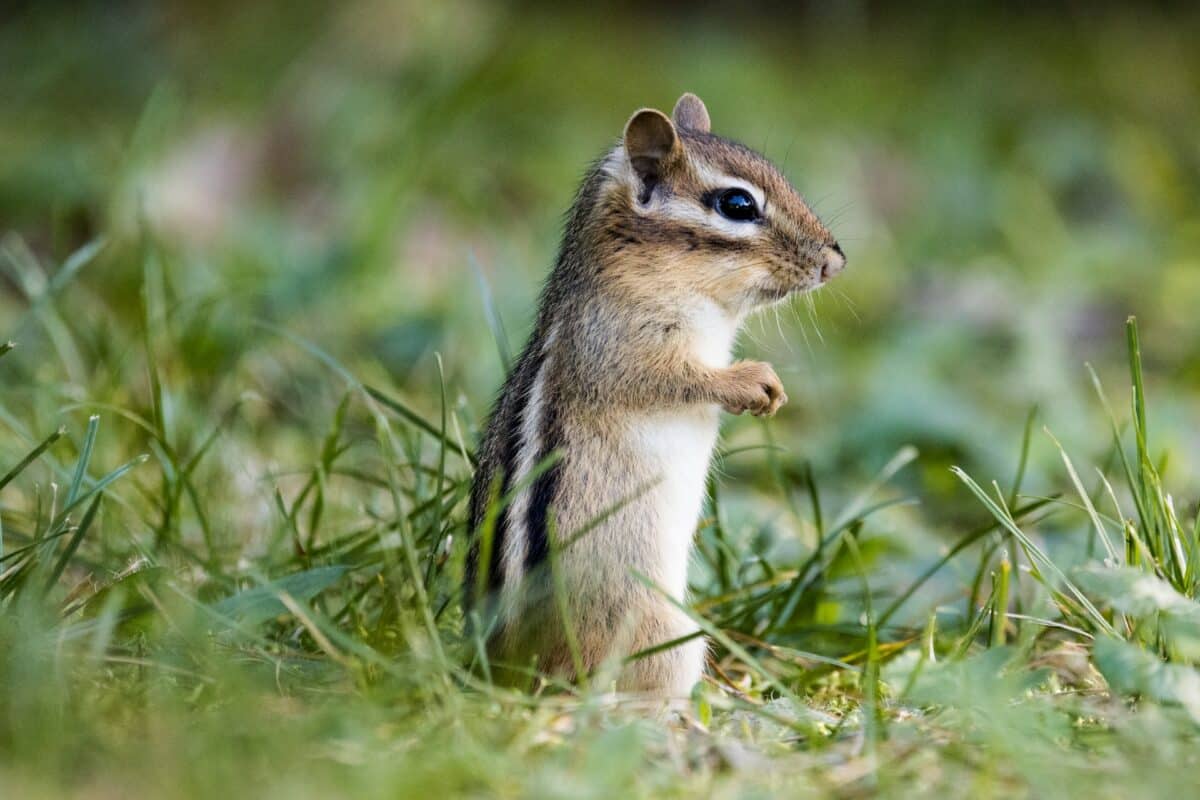
Differentiating between the poops depending on their color is one more way to distinguish between the poop of a chipmunk and rat or mouse. All these creatures are omnivorous, but chipmunks depend more on nuts and fruits for their nutrition. Because of this reason, chipmunks have a tendency to have paler poop.
Rats are opportunistic hunters. They eat everything from small insects, plant roots, and vegetables to waste. Typically their poop has a dusky color, so dark that it looks black.
Distribution or Scattering of Excretions
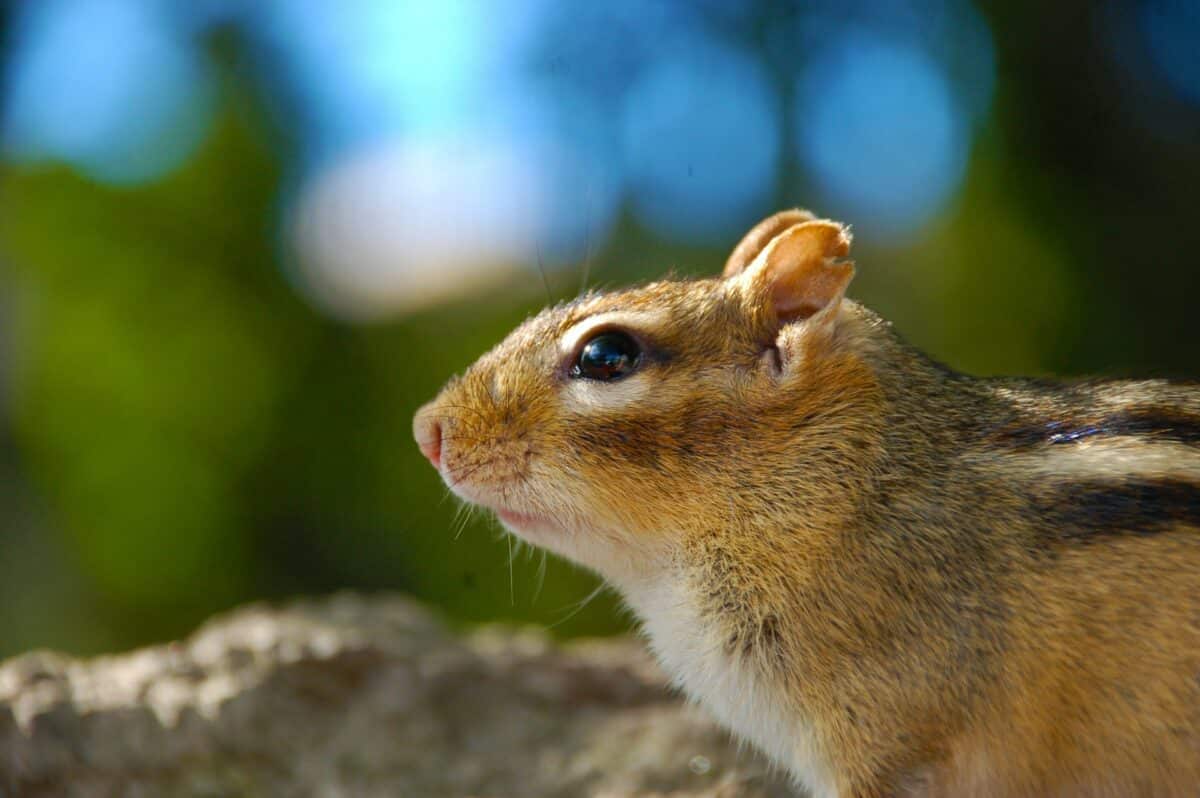
The easiest way to recognize a chipmunk poop is to look for its scattering. As previously stated, chipmunk hardly ever poop outside their burrows. Even if they have a need to excrete, they will not poop wherever they are. Rather, they would wait until they’ve found a non-dangerous toilet place.
More often than not, you won’t see a chipmunk’s poop. Chipmunks have dedicated latrine spots located within their burrows, where they will typically poop. But this is not the case with rats, who are likely to be less discreet about where they poop.
Rats poop wherever, even while on the move. It’s like they are leaving behind a trail.
What Happens If People Come in Contact with Chipmunk Poop?
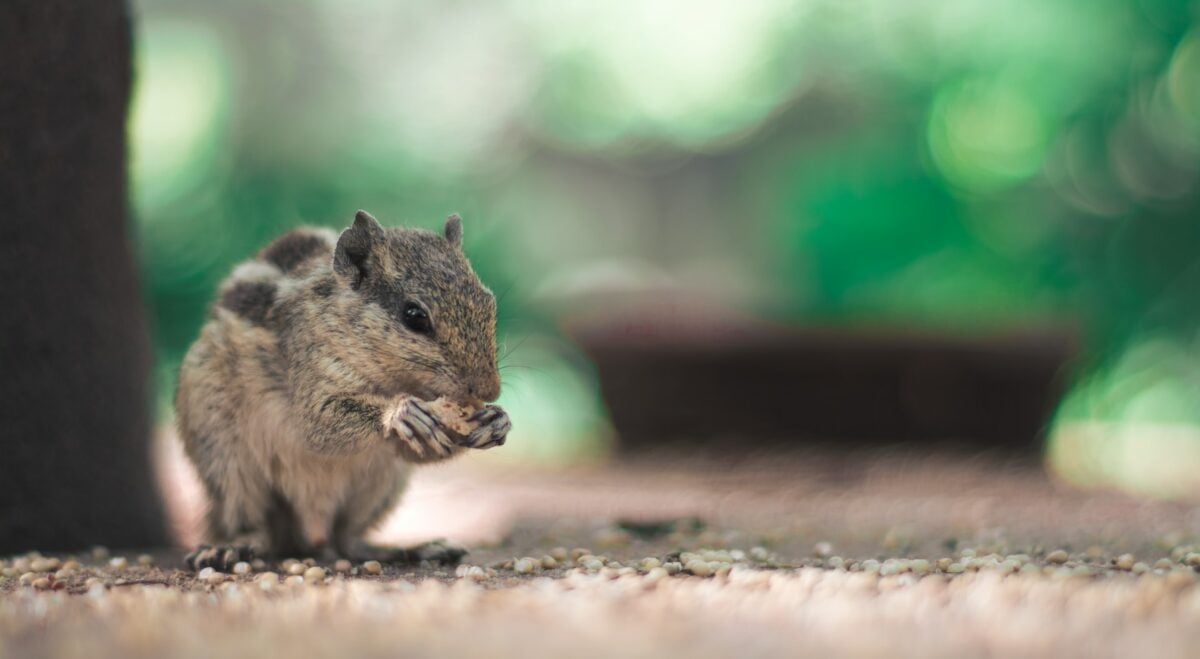
Chipmunk poop is unsafe and harmful, as is the discarded material of any omnivore or carnivore. As a result of their diet and irregular hunting, it is likely that chipmunk poop holds harmful bacteria and viruses.
As discussed in detail before, chipmunks don’t poop publicly, so it is uncommon for humans to have contact with their feces. But one needs to be particularly alert in case one has any pets because there is a greater chance that they may contract diseases from contact with chipmunk poop.
Some common diseases transmitted from chipmunk poop include Salmonellosis, Hantavirus, and Leptospirosis. Salmonellosis is a bacterial infection caused by salmonella bacteria, often found in chipmunk poop. Although not deadly, the signs and illnesses related to salmonellosis can remain for almost 7 days.
The usual warning signs include fever, abdominal cramps, diarrhea, and vomiting. The disease gets transferred through direct interaction by consuming food or water polluted by chipmunk poop.
Leptospirosis is a bacterial disease, primarily considered airborne (meaning the disease-causing agent is transferred through the air). Due the nature of the airborne bacteria, it is less likely that you’ll contract leptospirosis. It is chiefly caught by breathing in floating dust from powdered chipmunk poop.
Hantavirus is an extremely spreadable viral disease contracted by inhaling particles containing the virus from rodent feces, urine, or saliva. Although, because the animals choosing to poop in quiet and secret places, the likelihood of getting this disease is not as high.
How to Securely Remove Chipmunk Poop?
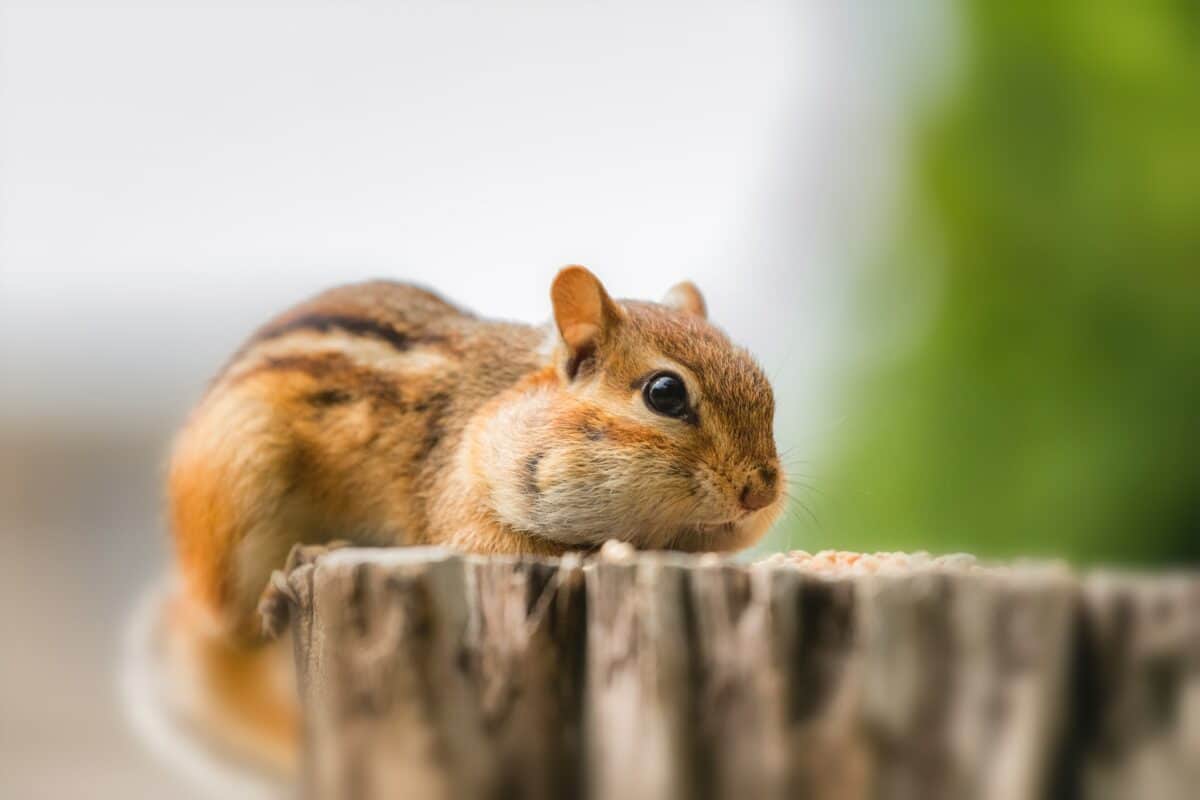
You won’t typically have to be concerned about cleaning chipmunk poop because of their secretive pooping nature, but if by chance one comes across a big latrine site or pooping station in the backyard of one’s garden, clear it in a careful manner.
This should be done with care and swiftness in case there are any children at home. It is important to ensure that one takes proper preventive measures by using gloves, a face mask, and rubber boots.
Listed below are some steps to follow to safely discard chipmunk poop:
- Examine if the poop has dried yet. If yes, try softening it by showering some water on it to ensure it doesn’t crumble. Crumbling leads to the abovementioned airborne bacteria being spread.
- If at all possible, poop should be burnt to avoid flies using the poop as a breeding ground. Opt for a shovel to collect the poop and burn the pile.
- It is recommended to spray disinfectants like sanitizers, bleaches, and decontaminators to the site after removing the poop.
- At all times, wash your hands after dealing with chipmunk feces and clean any surfaces the poop might have come into contact with. In situations where children are involved, it is also important to repeat again and again to them to wash their hands after playing in the area. It is necessary to know about the possible diseases that can be transferred from chipmunk feces.
How To Keep Chipmunk Poop In Check
Chipmunk poop can prove to be an annoyance, but it doesn’t need to be a chief difficulty. The suggested way is to make sure you don’t appeal and invite chipmunks in the first place. To do this, it is important to remove any leftover pet food or keep it away safely in storage and to throw away rubbish appropriately.
Seal any holes in your home or garden and trim vegetation around the house. Another great technique to deter chipmunks from inhabiting the area is by using a motion-activated sprinkler.
If you already have chipmunk poop in your yard, it’s vital to clear it up as soon as possible and dispose of it in a sealed plastic bag.
How to Avoid Chipmunks Inhabiting Your Garden
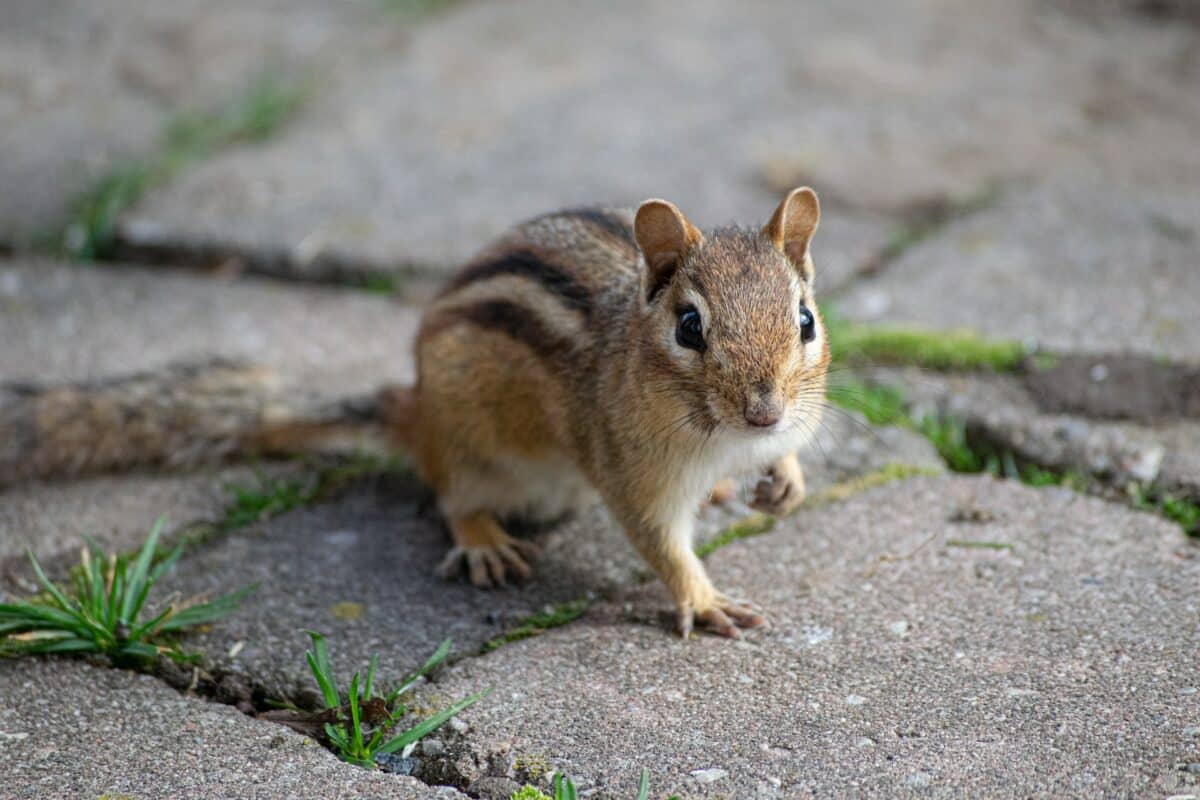
In order to make one’s house or backyard free from the chipmunks can be, to some extent, tricky.
In situations when one learns that chipmunks are present, it is very important to ensure they are removed safely. At all times, be mindful of the fact that every single creature on Earth has its fair right to live.
Bearing that in mind, it is important to follow the below-stated scheme of events to ensure that it’s more helpful and less threatening.
#1
Make sure to plan ahead of time with clear details of when and how you will do things. This also involves carefully considering what things you need to carry out the job properly and efficiently.
#2
As always, to prevent is better than to cure. Take steps to prevent their initial infestation. There are many ways to do this.
#3
Trim the bushes and plants in such a way that it doesn’t give the chipmunks adequate shelter.
#4
Place L-shaped footers along retaining walls, the house foundation, or sidewalk. This can prove to be an effective preventive technique against chipmunks digging under your home.
#5
Remove rocks or wood or piles placed against walls or foundations as they may give the chipmunks shelter to burrow hidden away from sight.
#6
The use of repellents is highly effective and practical, as chipmunks have a disliking towards strong smells. Such tricks like spreading naphthalene balls out in the garden or by walls and the foundation can prove to be a good preventive agent. Otherwise, the market-grade repellents are also extremely effective in deterring chipmunks.
#7
You can always make homemade repellents. These can be made out of Epsom salts, Lysol, and water.
#8
Often, chipmunks can be stubborn and keep returning. In those instances, trapping them and releasing them in a different place can prove to be the best option.
#9
At all times, choose the options that are kind and caring, without ever considering any form of killing trap. Also, it is important to be aware of the local laws about the trap and release of chipmunks.
#10
A small-sized trap with nuts or small fruits as bait can be placed in areas with much active chipmunk movement. Once trapped, free them someplace far away from your property. Make sure the chipmunk is not injured or harmed in any way.
#11
The most important factor to consider at all times is that whatever method you use to deter chipmunks, be mindful that they may have babies in the burrow or nest. If you are unsure of the babies’ presence, you should wait until they have grown up to take them away.
Wrapping Up
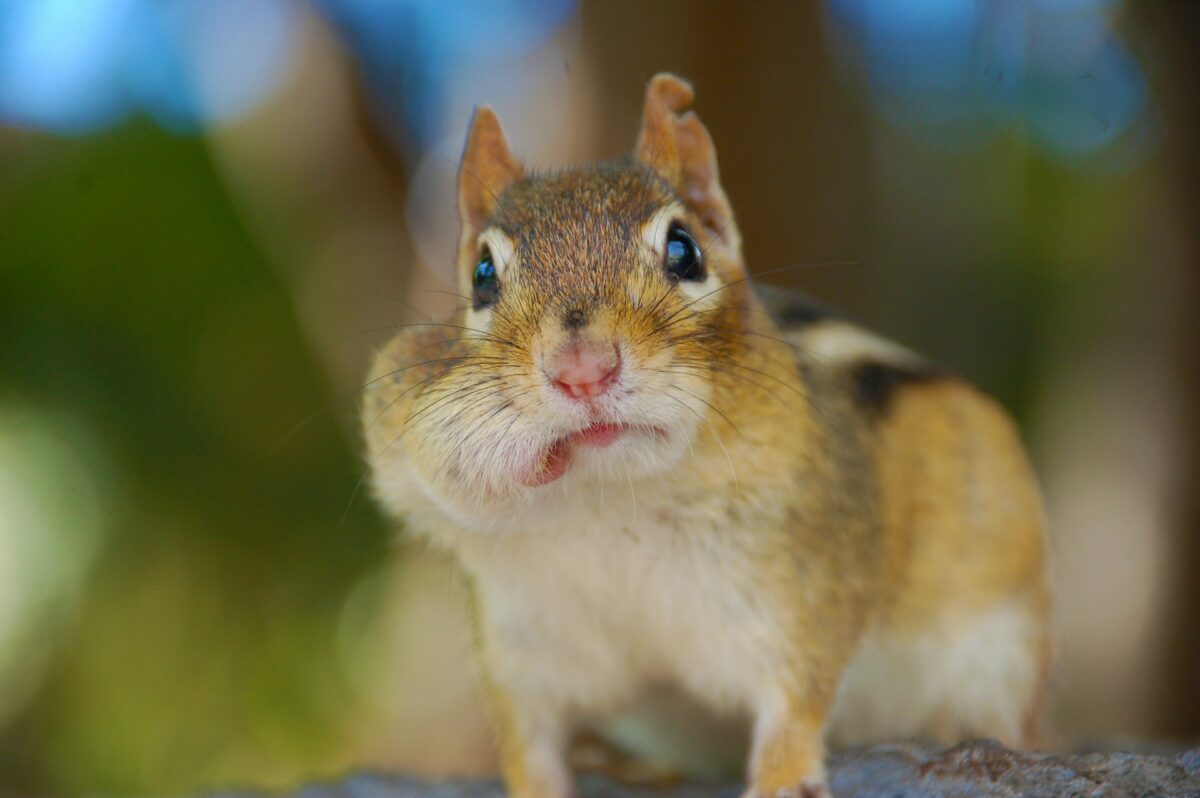
Key Facts
| The chipmunk poop or droppings are pellet-shaped with elongated and pointed ends, where each piece can measure less than 0,4 inches (one centimeter.) |
| The use of repellents is considered highly effective and practical, as chipmunks have a disliking of strong smells. |
| Chipmunk poop is unsafe and harmful, there are great likelihoods that chipmunk poop holds deadly pathogens and viruses. |
| Chipmunks have particular compartments inside their tunnels to poop, they don’t poop anywhere apart from their dedicated toilet site. |
| Some of the common diseases that can possibly be transmitted from chipmunk poop are Salmonellosis, Leptospirosis, and Hantavirus. |
| One effective practice would involve being mindful of removing wood or rock piles that are placed against walls or foundations as they may give the chipmunks shelter to burrow hidden away from sight. |
Each and every organism living on this earth have some necessary bodily functions, including eating and passing the digested food out of their bodies in the form of excretions, i.e., urine and poop. It may or may not interfere with the living quality of other people sharing the same habitat and environment.
The detailed writing which has been compiled above is an understanding of how and why chipmunks poop the way they do, their reasons for doing their business at designated sites, and the dangerous effects of their excretions after coming in contact with humans or their pets.
Thank you for reading this article! It’s easy to forget about the needs and habits of the members of the animal kingdom, let’s find out more! For example, let’s uncover What Moths Eat.
Join our Forum for free today!


